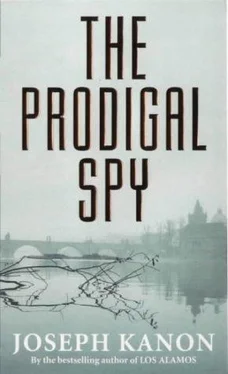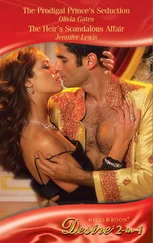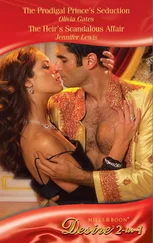“So what are you going to do?” Molly said finally.
“Why did it have to be him?” he said, almost to himself.
“Because it is.”
“I don’t know,” he said, answering her question.
“Finish it. That’s what you came here to do. End it.”
“It won’t end. It’ll start all over again.”
“Nick,” she said softly, “if you don’t do this, it’ll never stop.”
“Just name a few names.”
“That’s their politics. I’m tired of being them. He’s selling us out now. Us. I can’t be that neutral. Is this how we’re going to live, like them? They made a mess of their lives.”
“But we won’t,” he said ironically.
“Well, we can do it our own way. At least then we won’t know how it comes out.” She took out the envelope and handed it to him. “Here. It’s yours. You decide.”
Nick looked down at the envelope. “I can’t be his executioner, Molly.”
“Somebody’d better be. He’ll do it to you too.”
“He’s not going to kill me.”
“Yes, he is. Every time you look at him.” She hesitated. “It’s a lousy deal, Nick.”
He watched her turn away.
“Where are you going?”
“Over to the rally. If you want to join the living, meet me by the monument.” She stopped. “Then I’m going back to New York. I hate this place.” She looked up at him. “Come with me?”
“I’m not finished here.”
“I am,” she said, and walked away.
He went toward the Justice Department and stared up at the balcony, the envelope like a weight in his pocket. A lousy deal. But would this one be any better? Could you really buy freedom in a pact with the devil?
The lobby was busy, full of men in suits and short-cropped hair, Bureau style. A bank of phones. Guards, armed. Where Hoover had started the phony war that had finally circled them on 2nd Street and now-beyond an irony, something grotesque-Nick would hand him, so many years later, the unexpected paper to win it. The pragmatic deal.
But as he walked toward the reception desk, surrounded by Hoover’s foot soldiers, he knew he couldn’t do it. Not here. The old enemy. He saw Hoover snatching the prize, vindicated, unassailable at last. Which was worse, Larry for a few months or Hoover tape-recording for the rest of his life? How did you measure the damage? Molly had to see that. He’d be one of them. He turned, pretending he’d forgotten something, and walked out past the indifferent guards.
The rally was noisy and crowded. He walked past the line of police and portable toilets and parked ambulances-were they expecting trouble? — and into the mass swarming over the Mall. He felt a million miles from the somber candle vigil for Jan Palach. Bubbles and painted faces and scraggly hair. Shirts off in the sun. The defiant smell of dope. In the distance was a concert stage with loudspeakers, a group at its base yelling “Out now!”, the chant rippling back through the crowd in a wave. Homemade posters and peace buttons.
Where was she? Everyone looked young. Nick realized with a start that no one in the huge eager crowd had ever heard of the hearings, that the old war was not even a distant memory to them. Like Welles, the survivors had moved on to the next thing. An embarrassing moment in the republic, not even worth teaching in school, so the children, absorbed in their own war, would not even know it had happened. And Larry would survive this one too, betraying them all. A lousy deal. Molly was right. They needed to breathe their own air.
He’d never find her in this. He scanned the broad slope by the monument. A scuffle had broken out near the transverse road, and policemen were wading in to contain it. A kid next to him was watching it through binoculars.
“Pigs,” he said. “There go the pigs again.”
“Could I borrow these for a sec?”
“Look at the pigs, man,” he said, handing the glasses to Nick.
It wasn’t yet an incident. People stood watching without getting involved, like a highway accident. The police were leading two men away, but no one was protesting. Probably a fight someone had to break up, not a bust. People stepped back to clear a path, then started up the road again. Nick moved the binoculars across the young faces, then stopped, jarred by something out of place.
The woman was looking away, a little farther up the hill, annoyed she’d had to stop, anxious. In the carnival of the rally her determined face stood out like a warning. Not just any face. Ruth Silberstein. Nick followed her, hypnotized. What was she doing here? And when she turned to speak to the man with her, Nick felt the fear begin. Ponytail and acne: the guy from the adult store. Then Ruth pointed and Nick followed her finger to Molly, standing on the curb, looking around. Waiting for him.
“Hey, man,” said the kid, reaching for the binoculars.
“Just a minute. Please.”
It hadn’t been Hoover’s tail. He’d been telling the truth. Rrown, or someone, had been following her. Or had Barbara called in an alarm? And now they were here, just a few feet from her. He wanted to shout out. Hopeless. But she’d know them, run for it. Except she’d never seen Ruth Silberstein, never been in the store. Nick watched through the binoculars as they approached her. What story would they have? At first she smiled. Then a moment of panic on her face, a quick glance around for help. She stepped away, but Ruth pulled her in and the ponytail moved behind her, close to her back, and then they were moving off together toward Constitution Avenue in a huddle. Run.
Nick dropped the binoculars and started racing through the crowd, bumping into people, dodging section leaders with bullhorns. The chant came back from the stage again, and those who had been sitting, picnic style, jumped up. “Out now!” Nick tried to push through a wall of people, not even able to see the road anymore. Flailing through vines in a jungle, shoving them aside. “Hey, where’s the fire, man?” Someone said “Peace,” as if the word itself had power. Had they known all along, been aware of their amateur shadows? Brown’s elaborate route, a lure. Not just a dirty bookstore. Nick’s mind raced through the crowd, faster than his blocked feet. But why here, in public? What would have drawn them out? The envelope. They knew she’d taken the envelope. And then, as he edged around a group of girls, stalled, the other thought occurred to him. Larry. Of course he’d lie. There had never been any deal. You don’t wait. The oldest instinct in the book. She really had become Rosemary.
By the time he reached the road, calling out her name now, they had disappeared. He ran faster, trying to catch up. Police glared at him. Then he saw a car across the avenue, the ponytail bundling her in. He screamed her name. As she got into the car, she turned her head as if, impossibly, she’d heard him, and he thought, a final panic, that it could be the last time he’d ever see her. He ran across the avenue, halting traffic, but the car was pulling away, too far for him even to make out the license plate, and then sped around the corner.
He stopped and stood still, heaving. They’d question her first. But for how long? It was the lawn at Holeckova again, feeling utterly helpless. He glanced toward the line of police. But what would he say? And then, another jolt, what if they were following him too? Or was she just bait, Larry’s new bargaining chip? Bastard, he thought, and began running toward Pennsylvania Avenue. Somewhere they wouldn’t follow, if he could make it.
He tried to calm his breathing as he walked into the Justice Department. Don’t look out of place. He went to the row of phone booths and pulled out some change. If it had been Larry, they might not even question her. He already knew. Nick tried the Hay-Adams-not there. But you couldn’t call the White House. Unless your life depended on it. He dialed. The switchboard believed the emergency-the operator could hear it in his ragged breathing.
Читать дальше












